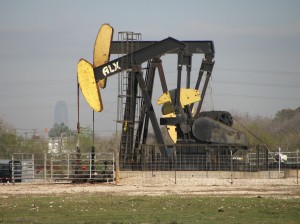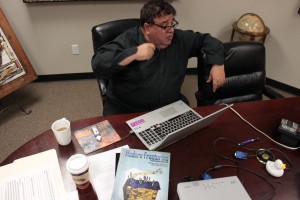Does Fracking ‘Steal’ Oil & Gas From Neighbors?

Dave Fehling / StateImpact
Pumpjack in oilfield in Houston
When it comes to settling disputes over who owns the oil & gas in Texas, the state’s law struck a federal judge as anything but fair. After reviewing an opinion by the Texas Supreme Court, he said it was more like theft.
“The Garza opinion gives oil and gas operators a blank check to steal from the small landowner,” wrote John Preston Bailey, a United States District judge in Wheeling, West Virginia.
Bailey had been asked to throw out a case involving a dispute between a landowner in West Virgina and a company drilling a horizontal well for natural gas. The company’s lawyers cited the Texas case, Coastal Oil & Gas v. Garza Energy Trust.
A Multimillion Dollar Award Denied
In that 2008 opinion, Texas justices overturned a multimillion dollar verdict awarded to families that owned farmland in Hidalgo County. The landowners had sued an energy company, alleging hydraulic fracturing led to the “draining” of the families’ natural gas over to the company’s well on an adjacent property.
But the Texas Supreme Court found that the longstanding “rule of capture” protects drillers from such “trespass” claims when drillers obey state law (as opposed to maliciously drilling a “slant well” to cross under a property line to steal oil & gas from under a neighbor’s property).
The Texas court said that when a well is drilled legally using hydraulic fracturing, “some drainage is virtually unavoidable”. The whole point of fracking is to use a mix of water, sand and chemicals injected deep underground to crack open rock formations so the oil & gas in them can flow over to the well. But those fractures can penetrate past a property line and “drain” oil or gas from that neighboring property for which the driller does not have a lease.
The Texas Supreme Court said one remedy for landowners who feel they’re being robbed of their minerals by a neighbor’s well is to simply drill their own.
“If the drained owner has no well, he can drill one to offset drainage from his property,” wrote Texas Justice Nathan Hecht.
In the West Virginia lawsuit, it was noted that “not all property owners are sophisticated enough or have the resources to drill their own well”. Earlier this year, the judge in that federal case ruled against the driller and allowed the lawsuit by the landowner to move forward.
Does Fracking Make an Old Rule Obsolete?
One key issue in these cases is whether fracking that is now widely used and is revolutionizing the oil & gas business should necessitate a different interpretation of the rule of capture.

Fracking authority Michael Economides in Houston was an expert witness in the Garza case
“Hydraulic fracturing changes everything,” said Michael Economides, an authority on fracking who was an expert witness for the families in the Garza case.
Talking about that case, he called it a “blatant example of stealing” and said there was “overwhelming evidence the fractures would penetrate the Garza’s” property and drain away natural gas. He said Texas drilling regulations need to be changed to better protect property owners.
To the contrary, the oil & gas industry believes, as held in the Texas Supreme Court opinion, that fracking is now essential to the oil & gas industry and while it may result in draining of neighboring minerals, drillers must be protected from charges of “trespassing”.
“It would have been a litigation nightmare,” said Keith Strama, an attorney with the Texas Oil & Gas Association. “That would be a very difficult dispute to resolve through science. The court recognized the best way to resolve this is to allow everyone to benefit from the rule of capture and if there’s drainage occurring, their remedy is go drill a well.”
Rule 37 and the Rights of the Little Landowner
For some landowners involved in disputes, that remedy doesn’t sound practical.
“We have a garden, we like to sit in our back yard, we don’t want to drill,” said Ranjana Bhandari. She and her family live in the Dallas suburb of Arlington. It’s in the Barnett Shale region of North Texas that in the past decade has seen the drilling of thousands of wells for natural gas production.
Bhandari said they didn’t like what they’d heard about the environmental impact of fracking so they declined to sign a deal with an energy company wanting to drill nearby. But she said while they tried to challenge the company by attending hearings held by state regulators, they lost.
“We could have gone to court but we don’t have the resources to go up against a company,” Bhandari told StateImpact.
When faced with such landowners who haven’t signed leases with drillers, those drillers can apply to the state regulator, the Railroad Commission of Texas, for what’s called a Rule 37 exception. If granted, “the wells can potentially capture hydrocarbons from beneath the adjacent, unleased property, and the neighboring mineral owner will receive no compensation for those minerals”, according to critical analysis last year by the Texas Tech Law Review. It found the Railroad Commission is granting such exceptions in far greater numbers as drilling has boomed, accelerating from an average of 582 exceptions a year since 1919 to an annual average of 3,916 since 2006.
“The existing methods by which Texas deals with unleased tracts in urban oil and gas fields leave unleased, small-tract mineral owners out in the cold,” according to the Law Review article.
The Railroad Commission of Texas disagrees. In an email to StateImpact, the commission’s media liaison Ramona Nye wrote that getting an exception isn’t easy, requiring “a lengthy Rule 37 hearing process”. Nye said drillers might therefore find it easier to negotiate with their neighbors to work out a lease deal.
Even when a driller is granted an exception, Nye said the wells cannot actually tap the oil or gas next door. But they can if the driller pursues what’s called “forced pooling” which, if approved by the state, does allow a driller to take oil & gas from an unleased property.

